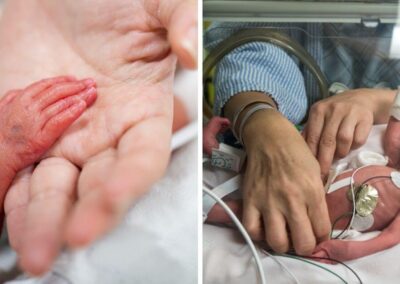A baby boy born 16 weeks early weighing just 1lb – about the same as a loaf of bread – has just celebrated his first birthday despite doctors giving him just a 25% chance of living.
Arley-James Hughes, from Morecambe in Lancashire, was born unexpectedly when his mother, Naomi, was hospitalised with a urine condition and a chest infection.
“I was on the toilet and I felt a pressure”, his mother said. “It was very scary. I knew instantly, right at that moment, he was coming”.
Concerned doctors advised parents to make funeral arrangements
Baby Arley-James was born so prematurely that Naomi was only able to hold him for a few moments before he was taken to the neonatal intensive care unit.
“I gave Arley a little cuddle and he made a purring sound that I’ll never forget but then he went straight into intensive care”, she said.
He was put on a ventilator and received blood transfusions soon after his birth. However, after four weeks in intensive care, Arley-James was diagnosed with a rare heart condition called fungal endocarditis. Doctors told his parents to prepare for the worst as the condition has a mortality rate of up to 75%.
“They said there was nothing more they could do for him”, Naomi said. “Basically, make funeral arrangements. It just floored me. I just ran out of the neonatal unit. It was possibly the worst news of my life”.
A little miracle
Following his diagnosis, Arley-James was put on a drug trial and his health started to improve over the next few weeks. His mother never left him during his time in the hospital, and believes the sound of her voice and touch helped him.
“The nurses said I’d given him support”, she explained. “He was in ‘containment hold’, which is where you put your hand on his head and another one on his chest and it really helps him”.
Amazingly and despite his trials, after 153 days in hospital, Arley-James was finally allowed to return home. While still on oxygen, he celebrated his first birthday at home surrounded by family.
“Arley has survived everything that’s been thrown at him, he’s a miracle”, his mother said. “I count my blessings every day. I know he’s got a long way to go. He still needs support with breathing, but I’m just amazed at his incredible strength”.
“For someone who weighed 500g to put up the fight he has and to be so happy and smiley throughout it all, there are no words to describe how proud and amazed I am”.
Babies are surviving earlier than the abortion limit
Arley-James was born 16 weeks early, right around the current UK abortion limit. Originally set at 28 weeks, the abortion limit was lowered in 1990 to 24 weeks gestation in reflection of medical and technological advances that had resulted in improving survival rates for babies born before 28 weeks gestation.
Since then, however, further medical advances have meant that babies born below 24 weeks gestation are increasingly able to survive.
During the debates ahead of the Human Fertilisation and Embryology Act 1990 becoming law, MPs referred to medical advances that had led to improved neonatal survival rates before 28 weeks gestation and the need for a reduction from 28 weeks.
Similarly, when the question of abortion time limits was revisited in 2008, the lowering of the abortion time limit in 1990 was again linked to the increased survival rates for babies born before 28 weeks gestation.
In the decade to 2019 alone, the survival rate for extremely premature babies born at 23 weeks doubled, prompting new guidance from the British Association of Perinatal Medicine (BAPM) that enables doctors to intervene to save premature babies from 22 weeks gestation. The previous clinical guidance, drafted in 2008, set the standard that babies who were born before 23 weeks gestation should not be resuscitated.
Spokesperson for Right To Life UK, Catherine Robinson, said “Arley-James’ story of survival in the face of a 75% mortality rate is inspiring and it is amazing to hear that he has recently celebrated his first birthday”.
“Legislators should pay close attention to these stories and support the move to reduce the abortion limit to 22 weeks”.












